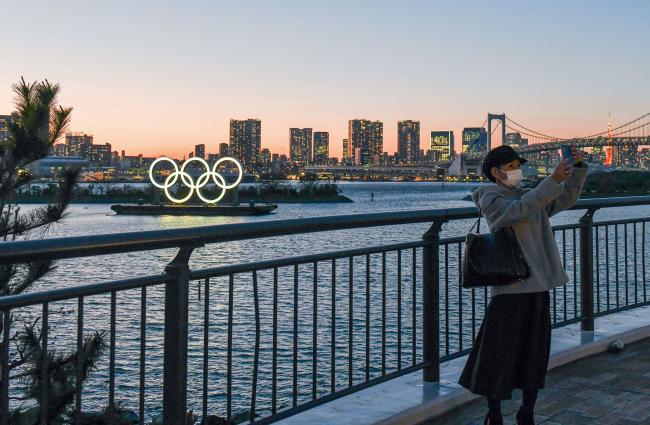(Bloomberg) -- The now-delayed Tokyo 2020 Olympics was supposed to showcase Japan’s recovery after the devastating 2011 earthquake and its economic revival after two-plus decades of anemic growth.
Now, even if the pandemic subsides and the Games proceed next year without a hitch, the event will be tinged with the aftermath of the coronavirus outbreak and an economic recession that laid bare the fragility of Japan’s recent growth.
“It’s a different story now,” said Satoko Suzuki, a professor at Hitotsubashi University’s School of International Corporate Strategy in Tokyo. “They originally wanted to show Japan is back on track.”
Some economists have already flagged the risk of the economy staying in reverse for a whole year as a result of a delayed Olympics. That’s a far cry from the stable growth promised by Prime Minister Shinzo Abe when he launched his Abenomics program over seven years ago.
Read More: Japan Could Face Year-Long Slump on a Delayed Olympics
With the virus upending lives around the world, and countries facing economic recession, a successful and even inspiring Olympics at some future date will be difficult to pull off. With the length of the pandemic and its human toll still unknown, when the Games are eventually held -- likely in the summer of 2021 -- it could come with nations still struggling or just starting to recover.
Past Olympics have seldom been thrown into such turmoil by a singular global event, with only world war seriously scuppering the timetable in the past. The message for the 1948 London Olympics -- held after a 12-year hiatus because of World War II, was the “Austerity Games.” The 1920 Olympics, held in Belgium in the aftermath of World War I, saw the first introduction of doves to symbolize peace.
Prime Minister Abe and International Olympic Committee President Thomas Bach agreed to the unprecedented move on Tuesday. The games will no longer start in July, and will be held in sometime in 2021. They will still be called the “Tokyo 2020 Olympic Games.”
The delay of the Games will shave about 2 trillion yen ($18 billion) off the economy, or about 0.4% of gross domestic product, in the year starting April, according to Yasuhide Yajima, chief economist at NLI Research Institute.
“We will see an impact especially on employment,” Yajima said. “I think workers like taxi drivers and bus drivers have managed to hold on to their jobs because the Olympics were coming. But a one-year delay might prompt their companies to fail or to lay off staff.”
With so much uncertaintly still surrounding the virus pandemic, not all economists are convinced that the Games will go ahead next year.
“There’s still uncertainty because vaccines for the virus may not have been invented and distributed by the summer of 2021,” BNP Paribas (PA:BNPP) economist Ryutaro Kono wrote in a research note after the postponement. “I see about a 60% chance of the Olympics taking place in 2021.”
Change Direction
The Olympics may no longer give Abe a crowning moment of success for his program to restore Japan to stable economic growth, but some observers argue that the postponement offers a chance to put a different spin on what the Games mean.
“Japan has the opportunity to put a very different face on things,” said Richard Sheehan, a professor specializing in sports economics at the University of Notre Dame’s Mendoza College of Business. The Games of the 20th century had little to distinguish themselves from each other, blurring together in global memory, he added. “They need to look at this from a world-wide perspective rather than from a Japanese perspective and say ‘This is a harbinger of better times to come.’”
The first opportunity to do that will be with the Olympic torch relay, which was supposed to start later this week but was canceled. The fate of the flame hasn’t been decided, but it’s sure to become a symbol in the months ahead.
During the past week, as postponement became a question of when and not if, Abe’s messaging around the event had already begun to shift. He began referring to the Games as “proof that the human race will conquer the new coronavirus.”
To make that happen, Japan’s goal will be to keep as much as the pomp and circumstance of the event intact. Abe said Bach backed him “100%” and they vowed to work together to hold the Games in complete form.
Olympic organizers and leaders will also have to manage the story as it shifts, Suzuki said. “When we have Olympics at the right time with the right scenario, it should be that it is humanity’s victory over the coronavirus.”
(Adds comments from economists)
©2020 Bloomberg L.P.
